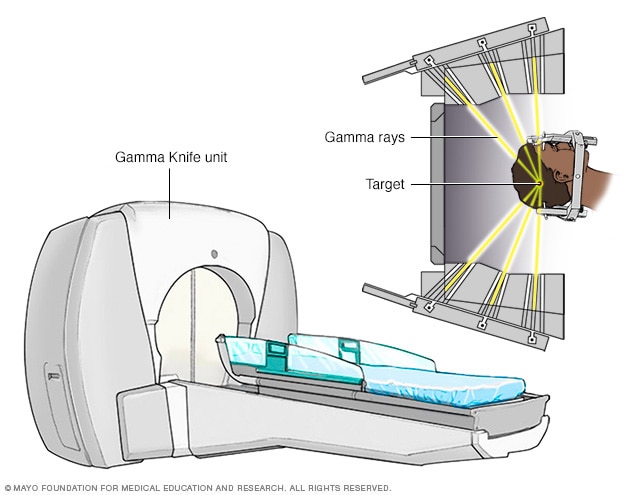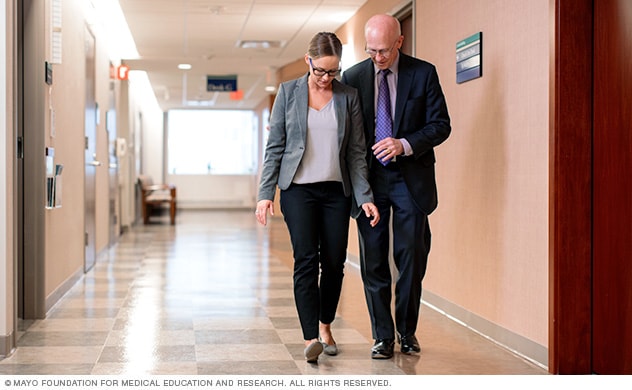Diagnosis
 Acoustic neuroma ear exam at Mayo Clinic
Acoustic neuroma ear exam at Mayo Clinic
A thorough physical exam, including an ear exam, is often the first step in acoustic neuroma diagnosis and treatment.
An acoustic neuroma is often hard to diagnose in the early stages because symptoms may be easy to miss and develop slowly over time. Common symptoms such as hearing loss also are associated with many other middle and inner ear problems.
After asking questions about your symptoms, a member of your health care team conducts an ear exam. You may need the following tests:
-
Hearing test, known as audiometry. This test is conducted by a hearing specialist called an audiologist. During the test, sounds are directed to one ear at a time. The audiologist presents a range of sounds of various tones. You indicate each time you hear the sound. Each tone is repeated at faint levels to find out when you can barely hear.
The audiologist also may present various words to test your hearing.
- Imaging. Magnetic resonance imaging (MRI) with contrast dye is usually used to diagnose an acoustic neuroma. This imaging test can detect tumors as small as 1 to 2 millimeters in diameter. If MRI is not available or you can't have an MRI scan, computerized tomography (CT) may be used. However, CT scans may miss small tumors.
Treatment
 Acoustic neuroma surgery at Mayo Clinic
Acoustic neuroma surgery at Mayo Clinic
Surgical removal of the tumor by an experienced neurosurgeon is one of many acoustic neuroma treatment options at Mayo Clinic.
Your acoustic neuroma treatment may vary, depending on:
- The size and growth rate of the acoustic neuroma.
- Your overall health.
- Your symptoms.
There are three treatment approaches for acoustic neuroma: monitoring, surgery or radiation therapy.
Monitoring
You and your health care team may decide to monitor an acoustic neuroma if it's small and isn't growing or if it's growing slowly. This may be an option if the acoustic neuroma causes few or no symptoms. Monitoring also may be recommended if you're an older adult or if you're not a good candidate for more-aggressive treatment.
While being monitored, you'll need regular imaging and hearing tests, usually every 6 to 12 months. These tests can determine whether the tumor is growing and how quickly. If the scans show the tumor is growing or if the tumor causes worse symptoms or other problems, you may need to have surgery or radiation.
Surgery
You may need surgery to remove an acoustic neuroma, especially if the tumor is:
- Continuing to grow.
- Very large.
- Causing symptoms.
Your surgeon may use one of several techniques for removing an acoustic neuroma. The surgery technique depends on the size of the tumor, your hearing status and other factors.
The goal of surgery is to remove the tumor and preserve the facial nerve to prevent paralysis of muscles in your face. Removing the entire tumor may not always be possible. For example, if the tumor is too close to important parts of the brain or the facial nerve, only part of the tumor may be removed.
Surgery for an acoustic neuroma is performed under general anesthesia. Surgery involves removing the tumor through the inner ear or through a window in your skull.
Sometimes removing the tumor may worsen symptoms if the hearing, balance, or facial nerves are irritated or damaged during the operation. Hearing may be lost on the side where the surgery is performed. Balance is usually affected temporarily.
Complications may include:
- Leaking of the fluid that surrounds your brain and spinal cord, known as cerebrospinal fluid. Leaking may happen through the wound.
- Hearing loss.
- Facial weakness or numbness.
- Ringing in the ear.
- Balance problems.
- Persistent headache.
- Rarely, infection of the cerebrospinal fluid, known as meningitis.
- Very rarely, stroke or brain bleeding.
Radiation therapy
Gamma Knife stereotactic radiosurgery

Gamma Knife stereotactic radiosurgery
Stereotactic radiosurgery technology uses many small gamma rays to deliver a precise dose of radiation to the target.
There are several types of radiation therapy used to treat an acoustic neuroma:
-
Stereotactic radiosurgery. A type of radiation therapy known as stereotactic radiosurgery can treat an acoustic neuroma. It's often used if the tumor is small — less than 2.5 centimeters in diameter. Radiation therapy also may be used if you are an older adult or you cannot tolerate surgery for health reasons.
Stereotactic radiosurgery, such as Gamma Knife and CyberKnife, uses many tiny gamma rays to deliver a precisely targeted dose of radiation to a tumor. This technique offers treatment without damaging the surrounding tissue or making an incision.
The goal of stereotactic radiosurgery is to stop the growth of a tumor, preserve the facial nerve's function and possibly preserve hearing.
It may take weeks, months or years before you notice the effects of radiosurgery. Your health care team monitors your progress with follow-up imaging studies and hearing tests.
Risks of radiosurgery include:
- Hearing loss.
- Ringing in the ear.
- Facial weakness or numbness.
- Balance problems.
- Continued tumor growth.
- Fractionated stereotactic radiotherapy. Fractionated stereotactic radiotherapy (SRT) delivers a small dose of radiation to the tumor over several sessions. SRT is done to slow the growth of the tumor without damaging surrounding brain tissue.
- Proton beam therapy. This type of radiation therapy uses high-energy beams of positively charged particles called protons. The proton beams are delivered to the affected area in targeted doses to treat tumors. This type of therapy lowers radiation exposure to the surrounding area.
Supportive therapy
In addition to treatment to remove or stop the growth of the tumor, supportive therapies can help. Supportive therapies address symptoms or complications of an acoustic neuroma and its treatment, such as dizziness or balance problems.
Cochlear implants or other treatments can be used for hearing loss.
 Supportive care for acoustic neuromas at Mayo Clinic
Supportive care for acoustic neuromas at Mayo Clinic
Supportive care including balance therapy, physical therapy, occupational therapy and hearing assistance is part of the comprehensive acoustic neuroma treatment at Mayo Clinic.
Clinical trials
Explore Mayo Clinic studies testing new treatments, interventions and tests as a means to prevent, detect, treat or manage this condition.
Coping and support
Dealing with the possibility of hearing loss and facial paralysis can be quite stressful. Deciding which treatment would be best for you also can be challenging. These suggestions may help:
- Educate yourself about acoustic neuromas. The more you know, the better prepared you can be to make good choices about treatment. Besides talking to your health care team and your audiologist, you may want to talk to a counselor or social worker. Or you may find it helpful to talk to other people who've had an acoustic neuroma. It may help to learn more about their experiences during and after treatment.
-
Maintain a strong support system. Family and friends can help you as you go through this challenging time. Sometimes, though, you may find the concern and understanding of other people with an acoustic neuroma especially comforting.
Your health care team or a social worker may be able to put you in touch with a support group. Or you may find an in-person or online support group through the Acoustic Neuroma Association.
Preparing for your appointment
You first may see a health care professional. This person may refer you to a doctor trained in ear, nose and throat conditions. Or you may be referred to a doctor trained in brain and nervous system surgery, known as a neurosurgeon.
Because there's often a lot to talk about during your appointment, it's a good idea to be well prepared. Here's some information to help you get ready and get an idea of what to expect.
What you can do
- Write down any symptoms you're experiencing, including any that may seem unrelated to the reason for which you scheduled the appointment.
- Make a list of all medicines, vitamins or supplements that you're taking.
- Ask a family member or friend to join you, if possible. Sometimes it can be hard to remember all the information provided to you during an appointment. Someone who comes with you may remember something that you missed or forgot.
- Write down questions to ask your health care team.
Preparing a list of questions will help you make the most of your time. For an acoustic neuroma, some basic questions to ask include:
- What is likely causing my symptoms?
- Are there any other possible causes for my symptoms?
- What kinds of tests do I need?
- What treatment options are available?
- Which one do you recommend for me?
- What is the likelihood of side effects from each treatment option?
- What happens if I do nothing?
- Are there any brochures or other printed material that I can take home with me? What websites do you recommend visiting?
In addition to the questions that you've prepared, don't hesitate to ask any that come up during your appointment.
What to expect from your doctor
You'll be asked a number of questions. Being ready to answer them can give you more time to go over any points that you need to clarify. You may be asked:
- When did you first begin experiencing symptoms?
- Have your symptoms been continuous or occasional?
- How bad are your symptoms?
- Do you have any family members with an acoustic neuroma?
- At its current level, can you hear using the affected ear? For example, can you use that ear on the phone? Does that ear help you tell where sound is coming from?
- Do you have regular headaches currently or have you had them in the past?